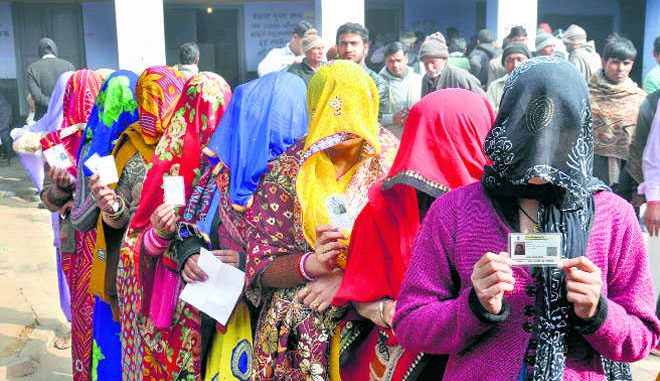
By Ashwani Kumar
In these testing times, commitment to nationhood and aspirations for a just social order demand a frontal encounter with injustice and infraction of our foundational values. The choices that we make now and in 2019 will determine the course of our evolution as the largest democracy.
When a former President of the nation endorses ‘widespread cynicism and disillusionment with governance’ and pleads for a Parliament that debates, a judiciary that dispenses justice and a leadership committed to the nation (Pranab Mukherjee’s Address reported on November 24), we can be certain that the Indian state is in decline.
Faltering performance of key institutions of democracy and rising social inequities strain our democratic polity and enlarge the fault lines of our politics. Those who seek comfort in GDP numbers and improvement of the country’s ranking in the Ease of Doing Business Index, need only to be reminded of the country’s 113th position out of 158 in the World Happiness Report (2018), 103rd out of 119 in the Global Hunger Index and 143rd position in the Global Peace Index of 2015, down from 123rd in 2008. India is ranked as the eighth most dangerous country for journalists in the 2016 Report of the International Federation of Journalists.
The nation confronts an unprecedented environmental challenge that can devour the gains of development and we suffer an ignominious reputation of having the most polluted capital and 13 of the world’s 20 worst polluted cities. Three thousand air pollution-related premature deaths reported in February 2017, the nation’s description as the world’s rape capital and 1,674 fatalities resulting from custodial torture between 2017 and 2018, that is five custodial deaths per day (ACHR Report, 2018) put us to shame. The purity of our political processes and the quality of democratic representation stand dented with almost 30 per cent of all legislators sharing a criminal background.
The project of national renewal anchored in an unswerving commitment to a vibrant democracy demands an end to the incestuous relationship between unaccounted wealth and politics. Obsessive cynicism about the political class as a whole has destroyed its credibility and weakened our democratic processes. The resultant imbalance in diffusion and exercise of state power ill serves popular expectations in a parliamentary democracy.
Endless tales of insensitivity and indifference to extreme poverty point to a narrowing ‘circle of human empathy’ that mocks our status as a rising economic power. Our politics, captive to an endless debilitating discourse rooted in personal animosities, defined by shrill rhetoric and laced in choicest vitriol exposes its bankruptcy on a daily basis. Neither can we claim to have vindicated law as ‘something above the state’ in matters of governance and preservation of rights, despite an ennobling national charter that celebrates the majesty of law.
Given these painful realities of a nation fraying at its edges, can we really stand tall in our own estimation and of the world despite being home to the tallest statue of a great son of India?
The diminishing indices of the republic mirror the incapacities of a nation limited by the smallness of its politics when compared to the gravity of challenges we face. We know that a nation divided within itself and cabined by politics that has yielded a fractured polity, glaring inequities and a divided society cannot address the daunting challenges without a broad political consensus on the way forward.
The challenges include ecological collapse, technological disruption altering the very ‘nature of humanity, pandemics, international terrorism, water wars, food shortages, drugs, human trafficking, assault on freedom and the suborning of democracy at the altar of ultra-nationalism et al.
In these testing times, commitment to nationhood and aspirations for a just social order demand a frontal encounter with injustice and infraction of our foundational values. Having suffered repeated assaults on our constitutional conscience in recent years, the nation must assert to reclaim its social cohesiveness and national unity based on inclusion, tolerance, plurality, equity, equality and benign patriotism.
The choices that we make now and in 2019 will define the future and determine the course of our evolution as the world’s largest democracy.
An informed and assertive citizenry alone can reshape the contours of flawed politics by rejecting ‘……political language designed to make lies sound truthful and give an assurance of solidity to pure wind……’ The triumph of democracy rests on our ability to vindicate truth, particularly when, to use the Shakespearean idiom, ‘……duty shall have dread to speak; when power to flattery bows…..’
An elevated politics imbued with the missing moral dimension in its processes can alone secure the triumph of principle over power, freedom over identity. A constitutional democracy with its distrust of absolute prerogatives is safe only in the custody of those who recognise the difference between totalitarian politics and accountable power.
And therefore, we need leadership that is daring and humble, caring and responsible. Thus far, we have defied the ‘tyranny of homogeneity’ and walked together to travel far. Bound as we are by our allegiance to the Constitution and lofty ideals of the founding fathers, we are obliged to reclaim and defend our political legacy by locating the larger purposes of politics in the dignity and esteem of the people. Hopefully, we will gravitate towards moderation in the conduct of our politics and yield to the dignitarian commands of the Constitution rather than navigating around it.
Source: The Tribune

Leave a Reply